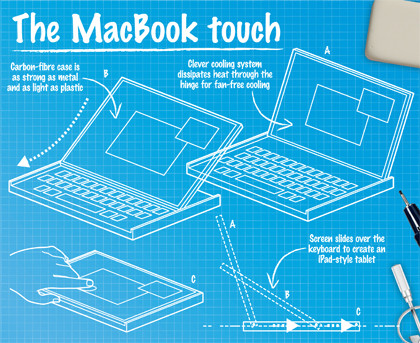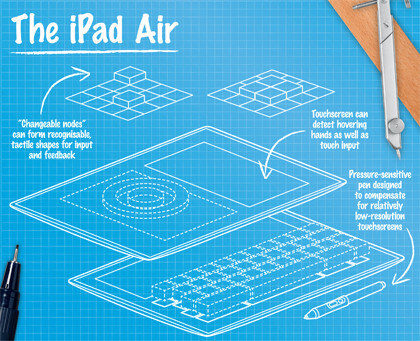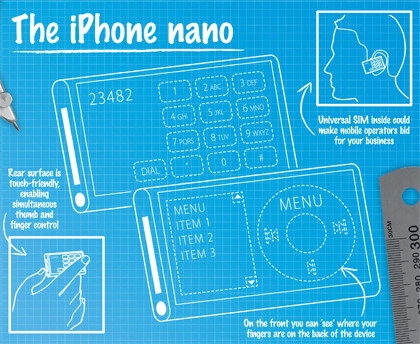What Apple's patents reveal about its plans
MacBook touch, iPad Air and iPhone nano on the way?
Sign up for breaking news, reviews, opinion, top tech deals, and more.
You are now subscribed
Your newsletter sign-up was successful
The MacBook touch

Description
Imagine a MacBook Air that becomes an iPad when you slide the display flat. Sounds great, doesn't it?
What is it?
A convertible MacBook with an integrated multi-band 3G/4G radio, carbon-fibre reinforced housing and a cooling system where the laptop's lid cools the processor. And it folds to become an iPad.
Patents used
Application Programming Interfaces for Scrolling Operations, USPTO application 20100325575, January 2007.
Sign up for breaking news, reviews, opinion, top tech deals, and more.
Reinforced Device Housing, USPTO application 20100289390, May 2009.
Methods and Apparatus for Cooling Electronic Devices Using Thermoelectric Cooling Components, USPTO application 20100050658, March 2010.
Methods and Apparatus for Cooling Electronic Devices Using Thermally Conductive Hinge Assemblies, USPTO application 20100053885, March 2010.
Antennas for Wireless Electronic Devices, USPTO 7,804,453, September 2010.
Dielectric Window Antennas for Electronic Devices, USPTO application 20100321526, June 2009.
Why we're excited
Apple's scrolling patent application includes diagrams of "a laptop device with a keyboard… the laptop device can be converted into a tablet" by sliding the display frame - the touchscreen bit - over the keyboard. Forget the arm-breaking Tablet PCs of the last decade and think MacBook Air.
In fact, think of a carbon-fibre MacBook Air: carbon fibre is as tough as metal and as light as plastic, but prone to cracking. Apple's patent application appears to have the solution: using multiple layers or a carbon-fibre frame so that the fibres don't all run in the same direction.
Other patents detail integrated 3G/4G radios in MacBook-style devices, possibly using the Apple logo as the antenna. Cooling systems might not be as glamorous, but they're important - which is why Apple's filed plenty of patents for cooling systems such as liquid-cooled laptops.
One of the most interesting ones uses the Peltier Effect, which can cool metal by passing an electric current through two different metals. Apple has also patented fan-free laptop cooling that dissipates heat through the laptop's hinge.
The iPad Air

Description
A lightweight, carbon fibre-encased iPad with a shape-shifting screen that can handle not just touch but waves and pen input too.
What is it?
An iPad whose display can "grow" real keys and whose touch sensors can interpret 3D gestures as well as 2D ones. The combination of haptic feedback and hover sensing could make Apple's tablet even more magical, and artists might like a pressure-sensitive pen that can overcome the limitations of low-res touch screens. It might even have an integrated stand.
Patents used
Detecting and Interpreting Real-World and Security Gestures on Touch and Hover Sensitive Devices, USPTO 7,877,707, January 2011.
Stylus Adapted For Low Resolution Touch Sensor Panels, USPTO application 20100006350, January 2010.
User Interface Having Changeable Topography, USPTO application 20100162109, June 2010.
Reinforced Device Housing, USPTO application 20100289390, May 2009.
Why we're excited
We like the iPad a lot, but, as we've all since discovered, its glossy glass screen isn't the best surface for touch-typing or gaming. However, the "changeable topography" patent application has a possible solution.
It presents a screen or trackpad that can "grow" buttons or other interface elements as required. It couldn't be made of glass though - as it's too solid - but would consist of "changeable nodes" that can form recognisable, tactile shapes. Such nodes might be controlled by tiny motors, or they might be made of a substance that expands or contracts when stimulated by an electrical, magnetic or chemical actuator.
That's not Apple's only interface idea. Building on the concept of multi-touch, its plans for "Touch and Hover Sensitive Devices" could interpret gestures such as a tap-and-hover, a "hitchhiking gesture" or even a thumbs-up.
And the pen? Steve Jobs may have mocked stylus-based tablets in the past, but that doesn't mean Apple won't introduce an artist-friendly pen input to the iPad. A pressure-sensitive stylus would be a boon in imaging apps.
The iPhone nano

Description
An incredibly small, cheap iPhone - think iPod nano with phone features - that jumps between networks and doubles as an electronic wallet.
What is it?
A super-small iPhone that supplements the familiar touchscreen with a second touch-sensitive panel on the back, enabling you to control the device with fingers and thumbs simultaneously. When you're using the rear screen, you'll "see" your fingers on the front screen: it's not transparent, though, it's just a clever idea for a cursor.
The phone includes a Universal SIM that uses the best available network provider, which could change throughout the day according to where you are.
Patents used
Back-Side Interface for Hand-Held Devices, USPTO application 20070103454, May 2007.
Handheld Computing Device, USPTO 7,724,532, May 2010.
Dynamic Carrier Selection, USPTO 7,885,654, February 2011.
Motion Based Input Selection, USPTO application 20100042954, November 2009.
Why we're excited
Imagine an iPhone that's the size of the current iPod nano. It probably wouldn't provide the full iOS apps experience - the iPod nano doesn't either - but it'd be capable of sending texts, checking email, playing media and all the usual smartphone stuff.
If you combine the iPhone's touchscreen with the touch-sensitive rear described in Apple's 2007 patent, you've found the solution to making the iPhone smaller yet easy to use. Similar technology is in the forthcoming PlayStation Portable replacement, Sony's NGP.
The Universal SIM could be bad news for mobile operators, as it suggests Apple is thinking of becoming an MVNO, a Mobile Virtual Network Operator. According to the patent, the phone would send a request for data to "a mobile virtual network operator server", which might ask networks to bid for your business.
Apple also fancies turning your iPhone into an electronic wallet - but it has bigger ambitions too. Its Motion Based Input Selection patent application describes NFC-enabled phones acting as electronic tickets and even security passes.
- 1
- 2
Current page: MacBook touch, iPad Air, iPhone nano
Prev Page What Apple's patents reveal about its plans
Contributor
Writer, broadcaster, musician and kitchen gadget obsessive Carrie Marshall has been writing about tech since 1998, contributing sage advice and odd opinions to all kinds of magazines and websites as well as writing more than twenty books. Her latest, a love letter to music titled Small Town Joy, is on sale now. She is the singer in spectacularly obscure Glaswegian rock band Unquiet Mind.